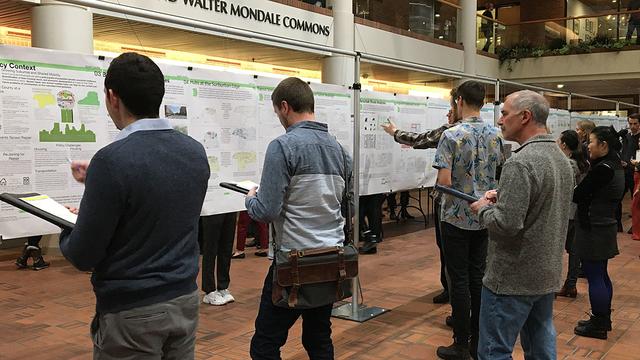the Resilient Communities Project. Photo: RCP
by Kevin Coss
As a public health coordinator, Lindsay Nelson understands there’s more to improving a community’s physical health than just encouraging nutritious eating and exercise—you also have to take down the barriers that get in the way of these healthy behaviors.
Nelson, coordinator of the Statewide Health Improvement Partnership with Scott County Public Health, is working toward that goal with the help of graduate students from the Humphrey School of Public Affairs and elsewhere at the University of Minnesota.
Over this past semester, Humphrey School students Tyler Boesch (MPP) and Katie Lawler (MHR) were part of the team that joined Nelson in devising community-driven ways to improve health equity for Scott County’s Latinx and Somali communities. They all took a course taught by Humphrey School Associate Professor Greta Friedemann-Sánchez.
Their project was one of several recent collaborations made possible through the Resilient Communities Project (RCP), a program that connects local government agencies in Minnesota with teams of graduate and professional students to bolster communities’ abilities to adapt and thrive in the face of social, economic, and environmental change.
RCP, part of the U’s Center for Urban and Regional Affairs, helps local government staff and community stakeholders choose a project that addresses issues in their community. The program then matches courses at the U to these projects, giving students an opportunity to conduct research, spark discussions, and bring innovative ideas and solutions to the table—around wastewater management, housing stability, public transit, or any number of other areas where a community might face challenges.
“Often these are projects the local community has really been struggling with for a while, or they have a lot of options, and they’re really not sure where to start,” said Mike Greco, cofounder and director of RCP. “It can be very valuable to the community to have a fresh perspective on the issue.”
Breaking Down Barriers to Health Equity
To address the barriers to healthy behaviors Nelson had identified, the students began by reviewing past data and reports from Scott County. They then conducted an in-depth, qualitative analysis of the factors that facilitate and impede physical activity for young women in the Latinx and Somali communities, as well as a literature review to assess the current status of the issue. Next, they developed a semi-structured interview and, with Nelson’s help, recruited members of the community to participate.
Master of Human Rights candidate Katie Lawler, the student lead on the project team, said the experience helped her and her fellow students understand some of the challenges that come with addressing community issues.
“We did not anticipate how difficult it might be to connect with people and to gain their trust, nor did we anticipate that physical activity might be perceived as a sensitive topic for some participants,” said Lawler, who is also a neonatal intensive care unit nurse. “However, we were also surprised by how much fun we had meeting community members and conducting the interviews, and how much we learned about them and ourselves.”
After the interviews, the students coded and analyzed their research data to create a final report, which they delivered to Nelson and the Scott County team.
“Our group was really grateful for the opportunity to collaborate with Scott County,” Lawler said. “It was a privilege to be able to utilize our colleagues’ experience and resources to help drive our project.”
From the county’s perspective, Nelson said she is excited by the ways the collaboration with RCP has helped set the stage for future progress in removing barriers to healthy behaviors. A new food pantry at a local church and more healthy food options at a local Somali grocery store are two examples of changes already in the works.
“We will be creating community advisory groups to move the work forward within their own communities while utilizing the feedback gained from the interviews the students conducted,” she said.
Part of Something Larger
Since it was launched in 2012, RCP has connected hundreds of students from more than 50 academic disciplines to hands-on research and learning experiences. Like Lawler and her classmates, many students in RCP are excited to be part of something larger and apply their knowledge and skills to real community problems.
“The opportunity to have their work actually realized or implemented is a big motivating factor for students,” said Sarah Tschida, RCP’s program coordinator.
Through their participation, students not only research a problem and propose solutions to it, but advocate for their recommendations in front of decision makers, answering their questions directly. Students learn lessons that are hard to teach in classroom settings, such as how even the best ideas must work within financial constraints, staffing limitations, and the political structures of an office or department.
Experience in RCP can also go a long way in preparing students for their future careers, by helping to build their professional networks and providing portfolio material that sets them apart during a job or internship interview. It can also provide students with key career skills, Tschida said, such as communicating recommendations or results that might not line up with what decision makers expect to hear.
“They need to find a way to navigate sharing what might be some difficult information with the project lead or the government partner,” she said. “There’s a certain level of diplomacy and strategy that goes into communicating things that may be difficult for others to hear, but are really important to say.”
Kevin Coss is a communications specialist with the Office of the Vice President for Research (OVPR).
A version of this story originally appeared in Inquiry, an OVPR publication.


